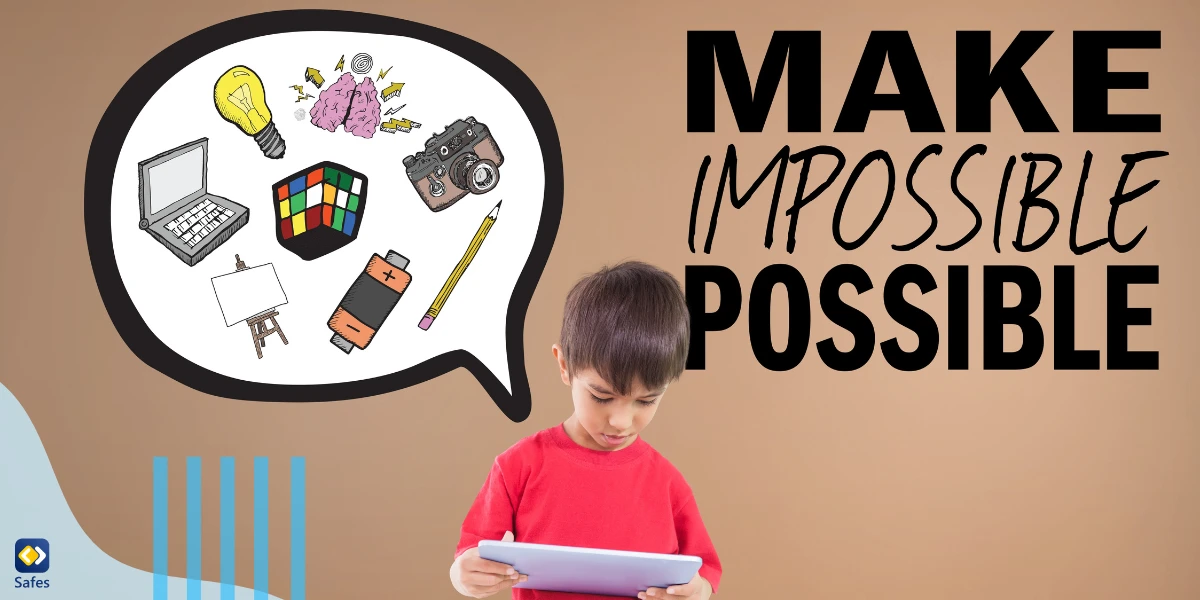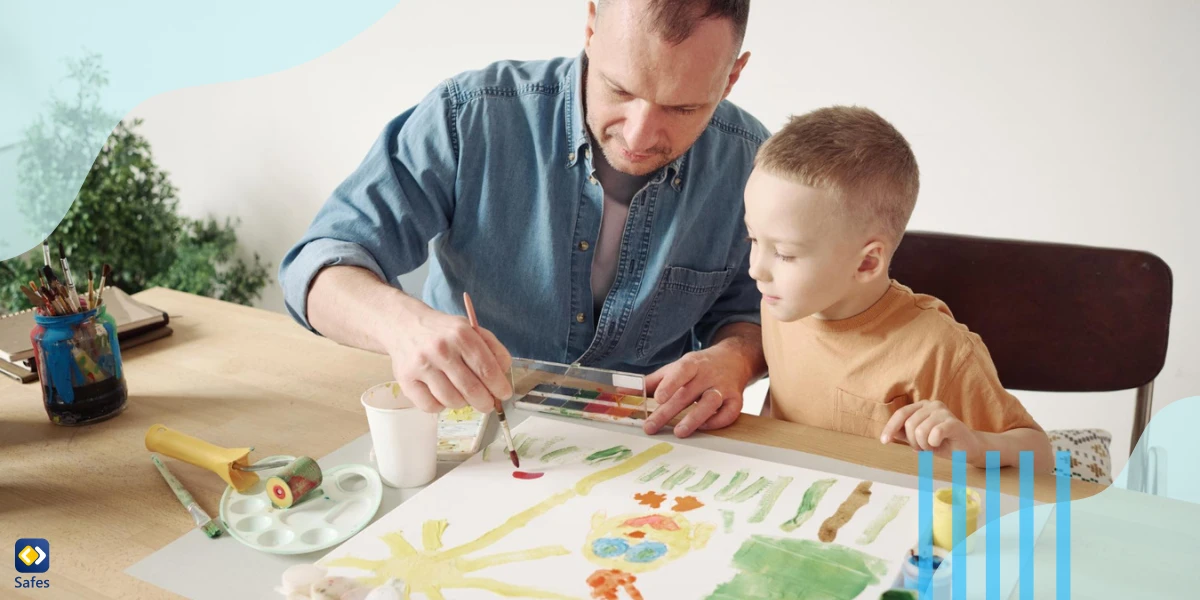Today, we’ll be discussing the importance of fostering a growth mindset in children and how you can help unlock their full potential with some inspiring activities and exercises. A growth mindset is the belief that your abilities and intelligence can be developed over time with effort and perseverance, and it’s a crucial mindset to cultivate in children for their academic and personal development. By encouraging a growth mindset early on, children are more likely to embrace challenges, persist through setbacks, and ultimately achieve their goals. So, without further introduction, let’s dive into some fun and effective growth mindset activities for kids!
Download and Start Your Free Trial of the Safes Parental Control App
Understanding Growth Mindset
With a fixed mindset, a person thinks their abilities are pretty much set in stone. They’re like, “I’m good at this, but I’ll never be good at that, and that’s just how it is.”
But with a growth mindset, a person believes they can always improve, learn new things, and get better at stuff. It’s like saying, “I might not be great at this right now, but with practice and hard work, I can totally make it!”
Encouraging that growth mindset in kids helps them see that they can always grow, learn, and get better.

6 Growth Mindset Activities for Kids
If you’re a parent who knows the value of having a growth mindset, you must be looking for ways to develop this way of thinking in your kid. If so, try these fun growth mindset activities for kids:
Setting and Tracking Goals: Teach your kid to set realistic and achievable goals and encourage them to monitor their progress regularly and reflect on their achievements.
Embracing Challenges: Encourage a positive attitude towards challenges in your kid and teach resilience and problem-solving skills.
Practicing Positive Self-Talk: Remind your child to recognize negative self-talk and replace it with positive affirmations while encouraging self-encouragement and self-belief.
Celebrating Effort and Persistence: Teach your child how to value effort and hard work over immediate success and recognize and celebrate the process of learning and improvement.
Learning from Mistakes and Feedback: Teach your little one to view mistakes as opportunities for growth and emphasize the importance of constructive feedback.
Cultivating a Growth Mindset Environment: Create a supportive and encouraging classroom or home environment that models a growth mindset through language and behavior. Remember, fostering a growth mindset for students is a process and requires ongoing effort and practice.
Integrating Growth Mindset into Everyday Life
Fostering a growth mindset in everyday life means embracing challenges, learning from mistakes, and believing in the potential for growth and improvement in our daily tasks. That also includes school. In academic subjects, connecting growth mindset principles means encouraging students to view challenges as opportunities for growth and to embrace the learning process. For example, instead of getting discouraged by a low test grade, students can use it as an opportunity to identify areas for improvement and make a plan to work towards better results in the future.
Similarly, applying growth mindset to extracurricular activities and hobbies means encouraging students to embrace challenges and view setbacks as opportunities for growth. Whether it’s trying a new sport or a new instrument, students can practice positive self-talk, celebrate their effort and persistence, and learn from mistakes and feedback to develop a growth mindset in all areas of their lives. Developing a growth mindset is an ongoing effort and practice, but it can have a powerful impact on students’ confidence, motivation, and success.

Resources and Tools for Supporting Growth Mindset
You’re not alone in your quest to support a growth mindset in your kid. Here are some resources and tools that can help you along the way:
There are many books, videos, and online resources that can help kids develop a growth mindset. Some recommended options include “The Power of Yet” by Maryann Cocca-Leffler, “Your Fantastic Elastic Brain” by JoAnn Deak, and “The Most Magnificent Thing” by Ashley Spires. Khan Academy also offers free educational videos that can help kids learn to embrace challenges and develop a love of learning.
Collaborating with parents and caregivers is crucial in reinforcing growth mindset at home and school. You can also model a growth mindset yourself by being open to learning new things and embracing challenges. Communication between parents and teachers is also important to ensure that growth mindset principles are being reinforced both at home and at school.
How Can Safes Help Develop Growth Mindset in Kids?
The Safes parental control app can be a great tool to help develop growth mindset in kids. By limiting screen time and blocking harmful apps and websites, kids can focus on other activities that promote learning, such as reading, playing outside, or practicing a new skill. These parental controls can help them develop a sense of self-discipline and determination, which are important elements of a growth mindset. Additionally, by monitoring and tracking their progress, parents can help their children set achievable goals and celebrate their achievements, reinforcing a sense of growth and progress.
The good news is that Safes is available on all phones, tablets, and computers powered by Android, iOS, Windows, and Mac, so your child is protected everywhere. Safes also offers a free trial, allowing you to explore its parental control features before making any commitment. Learn about how to put parental controls on different devices with Safes using the links below:
- Windows parental controls
- Macbook parental controls
- Parental controls on Android
- iPhone parental controls
Growth Mindset Activities for Kids: Conclusion
Fostering a growth mindset in children is essential to help them overcome challenges, build resilience, and achieve success. There are many effective growth mindset activities for kids, including reading books like “The Power of Yet,” “Your Fantastic Elastic Brain,” and “The Most Magnificent Thing,” as well as watching Khan Academy videos. Collaborating with parents and encouraging them to reinforce growth mindset at home is also crucial. Additionally, parents can use apps like Safes parental control to limit screen time and track progress to set achievable goals and celebrate achievements. By providing children with resources and tools to support a growth mindset, we can help them develop crucial skills and attitudes that will serve them well throughout their lives.
Your Child’s Online Safety Starts Here
Every parent today needs a solution to manage screen time and keep their child safe online.
Without the right tools, digital risks and excessive screen time can impact children's well-being. Safes helps parents set healthy boundaries, monitor activity, and protect kids from online dangers—all with an easy-to-use app.
Take control of your child’s digital world. Learn more about Safes or download the app to start your free trial today!




